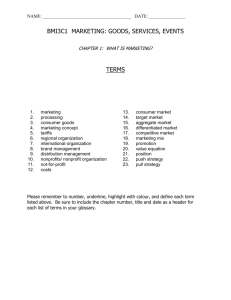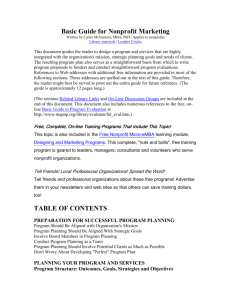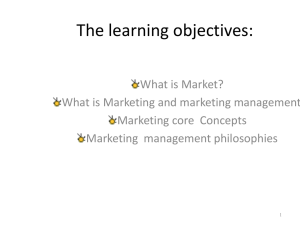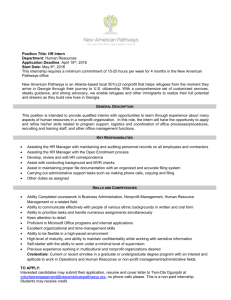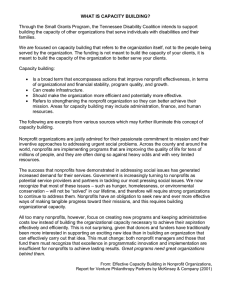BUCO 485 BUSINESS COMMUNICATION MANAGEMENT for NONPROFITS
advertisement
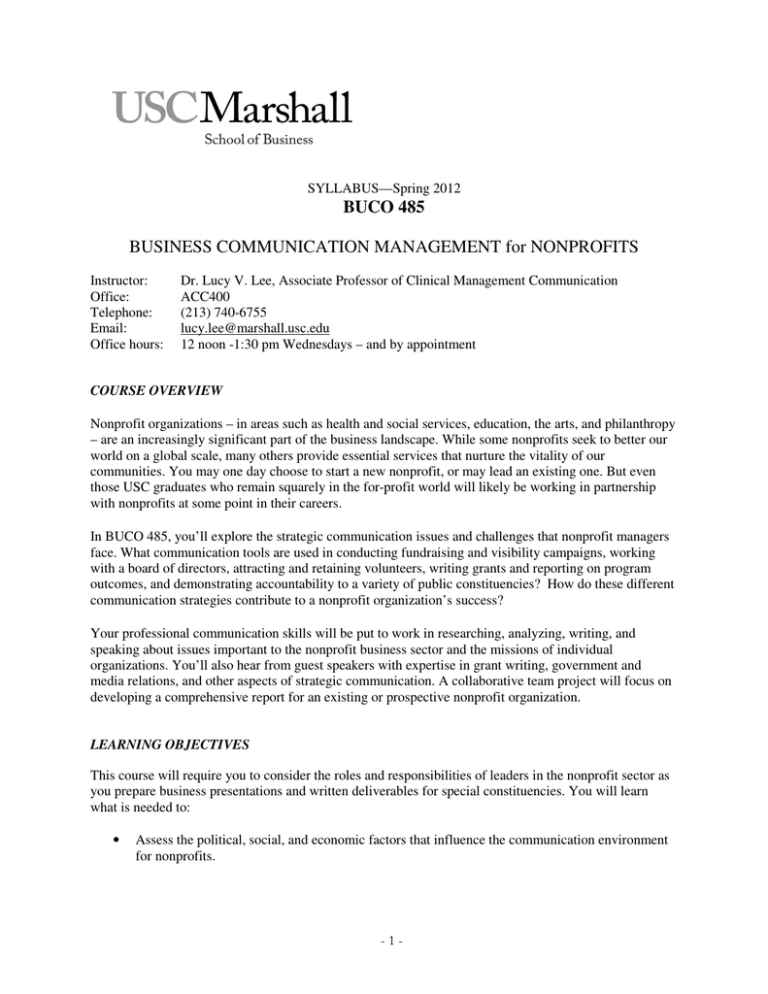
SYLLABUS—Spring 2012 BUCO 485 BUSINESS COMMUNICATION MANAGEMENT for NONPROFITS Instructor: Office: Telephone: Email: Office hours: Dr. Lucy V. Lee, Associate Professor of Clinical Management Communication ACC400 (213) 740-6755 lucy.lee@marshall.usc.edu 12 noon -1:30 pm Wednesdays – and by appointment COURSE OVERVIEW Nonprofit organizations – in areas such as health and social services, education, the arts, and philanthropy – are an increasingly significant part of the business landscape. While some nonprofits seek to better our world on a global scale, many others provide essential services that nurture the vitality of our communities. You may one day choose to start a new nonprofit, or may lead an existing one. But even those USC graduates who remain squarely in the for-profit world will likely be working in partnership with nonprofits at some point in their careers. In BUCO 485, you’ll explore the strategic communication issues and challenges that nonprofit managers face. What communication tools are used in conducting fundraising and visibility campaigns, working with a board of directors, attracting and retaining volunteers, writing grants and reporting on program outcomes, and demonstrating accountability to a variety of public constituencies? How do these different communication strategies contribute to a nonprofit organization’s success? Your professional communication skills will be put to work in researching, analyzing, writing, and speaking about issues important to the nonprofit business sector and the missions of individual organizations. You’ll also hear from guest speakers with expertise in grant writing, government and media relations, and other aspects of strategic communication. A collaborative team project will focus on developing a comprehensive report for an existing or prospective nonprofit organization. LEARNING OBJECTIVES This course will require you to consider the roles and responsibilities of leaders in the nonprofit sector as you prepare business presentations and written deliverables for special constituencies. You will learn what is needed to: • Assess the political, social, and economic factors that influence the communication environment for nonprofits. -1- • Apply fundamental management communication principles in analyzing organizational communication tools and tactics used by nonprofit organizations. • Develop strategies for communicating with a range of internal and external constituents: funders, board members, volunteers, staff, media, lawmakers, and those served by nonprofit and public organizations. • Evaluate the intersection of for-profit and not-for-profit businesses, considering the potential for communicating complementary strategic goals and forging partnerships. • Collaborate productively as part of a team in conducting research and analysis, writing and editing documents, and preparing oral presentations focused on advancing communication strategies. TEXTS Forces for Good: The Six Practices of High-Impact Nonprofits by Leslie R. Crutchfield and Heather McLeod Grant, 2008. (Available from Amazon.com.) You will also be asked to read supplementary materials distributed in class, via Blackboard, or held on reserve at Crocker Business Library. Two chapters will be distributed from The Jossey-Bass Handbook of Nonprofit Leadership and Management, 2010. YOUR RESPONSIBILITIES Professional behavior is a must and includes turning in assignments on time, coming to class fully prepared even if you were unable to attend a previous session, and initiating timely communication with me about any troubles you are having with any aspect of the course. ATTENDANCE AND PUNCTUALITY You are expected to attend all scheduled class sessions or team meetings, arriving on time and prepared. If you need to miss a class, you are welcome to notify me by phone or email – but keep in mind that notification in advance does not “excuse” your absence – it simply shows me that you are taking responsibility for the decision not to come to class. Absences from class and/or a pattern of lateness – particularly on days we have scheduled visits from guest speakers or other important activities – will adversely affect your grade (in the same way that such behavior would adversely affect your performance evaluations in a professional setting). CONDUCTING RESEARCH, USING EMAIL AND BLACKBOARD I’ll expect that your research for various projects in this class will be thorough and thoughtful. It should be appropriately documented using APA formatting guidelines. Please make productive use of the Marshall electronic library. Go to the Marshall homepage at http://www.marshall.usc.edu/ then click "Library" and under Crocker Library "Resources" to access electronic databases. -2- We will be using Blackboard web-based course management in this class for communication, electronic submission of some small assignments and peer evaluations, participation in discussion boards and group pages, and access to important materials (https://blackboard.usc.edu/). Check out our course on Blackboard regularly. In case of emergency when travel to campus may be difficult, USC executive leadership will announce an electronic way for instructors to teach students in their residence halls or homes using a combination of Blackboard, teleconferencing, and other technologies. MY RESPONSIBILITIES Classes will start and end on time. I will make course objectives and my expectations for each assignment clear, and return graded assignments as promptly as possible. When appropriate, I will assess your relative performance in the class. My goal is to help you become more polished and persuasive communicators as you consider the special challenges facing business leaders working in or with the nonprofit sector. If you prepare for and attend all classes, participate actively in exercises, discussions, and special projects, and complete all readings and assignments conscientiously, you will improve your skill level and gain a greater understanding of how to communicate effectively as a leader in this growing and influential business arena. OVERVIEW OF COMPONENTS OF FINAL COURSE GRADE Individual assignments – written deliverables: Diagnostic Writing Assignment (business letter – 1-2 pages) Press Release/Media Alert + Analytical Memo – announcing a hypothetical bequest to a particular nonprofit organization (2-3 pages) Analysis of Direct Mail Materials – comparison among “competing” nonprofits/charities (memo – 1-2 pages) Profile – a short article based on an in-person interview with a volunteer, client, board member, administrator, staff member, or funder associated with a local nonprofit or corporate philanthropy (3-4 pages) Team assignments – written deliverables: Proposal Memo – suggesting a local nonprofit organization for in-depth analysis, or an plan for a new nonprofits (1 page) Preliminary Communication Audit of the organization (2-3 pages) Final Project Report (up to ten pages) 25 points 75 points 50 points 150 points 25 points 75 points 250 points Individual assignments – presentations/deliverables: "Call to Action" Presentation in ELC on 2/29 Participation in ELC exercise on 2/1 75 points 50 points Team assignments – presentations Presentation on Internet Resources Chapter Presentation – "Forces for Good" Final Project Presentation in in ELC on 4/25 25 points 50 points 200 points Final Exam – based on readings, lectures, discussions, self- and peer assessments -3- 100 points Professionalism – Includes, for example: being prepared for in-class exercises; participating in guest speaker events and discussions; submitting deliverables on time; conscientiously offering peer evaluations and selfcritiques, both orally and in writing; timely communication with professor 50 points TOTAL POINTS POSSIBLE 1200 * * * * * A Note on the Final Project – a significant part of the course grade: The elements of the Final Project include both a written report and final team presentation. Working in pairs, students will develop a strategic communication plan of up to ten pages and prepare a short oral presentation (8-10 minutes) addressing a specific challenge or opportunity for a nonprofit agency (or for a new nonprofit organization the team is proposing). As part of the report and/or presentation, students will also develop and submit two tactical products to support their plan (draft brochure text, press release, direct or e-mail solicitations, website design evaluation/description, sample newsletter, etc.) Each team will present an executive level overview of their plan and showcase their tactical products in a presentation scheduled on Wednesday, 4/25 in the Bridge ELC. The final report is due on Friday, 5/4, by 3 pm in my office in ACC 400. TWO hard copies of the final report must be turned in on that date. The final exam will take place on the regular final exam day/time assigned to our class. IMPORTANT DATES Monday, January 16 Monday, February 20 March 12 – 16 April 6 April 27 May 11 Martin Luther King Day – Holiday Presidents’ Day – Holiday Spring Break Last day to drop a class with a “W” Classes end Commencement On the following dates our class will meet in the ELC, all Wednesdays: 2/1, 2/29, and 4/25. Please note that work scheduled on these three dates cannot be made up on other class meeting days. GRADING POLICIES You are always evaluated first on the basis of the content of your presentation or written work. Are the ideas relevant, logically organized, and well supported? Also, the way you structure your ideas and shape them for a particular audience significantly affects the grade on any assignment, whether written or oral. If an assignment is returned to you and you believe that some error has occurred in the grading, you can, within one week of the date the assignment is returned to you, request – using a memo – that I re-evaluate the assignment. A copy of the original graded assignment or presentation evaluation form should be attached to your memo, which should fully and carefully explain why you think the assignment should be re-graded. -4- ADMINISTRATIVE MATTERS Plagiarism – Plagiarism is the unacknowledged and inappropriate use of the ideas or wording of another individual and is considered a grave violation of academic integrity; the sanctions against it are correspondingly severe. (Sanctions recommended by the University range from a grade of “F” in the course to suspension from the University.) Most simply, plagiarism can be characterized as ‘academic theft.’ As defined in the University Student Conduct Code (published in the current SCampus), plagiarism includes: ‘The submission of material authored by another person but represented as the student’s own work, whether that material is paraphrased or copied in verbatim or near verbatim form; ‘The submission of material subjected to editorial revision by another person that results in substantive changes in content or major alteration of writing style; ‘Improper acknowledgment of sources in essays or papers.’ (Excerpted from 2010-11 SCampus – University Governance, Section 11.00: “Behavior Violating University Standards and Appropriate Sanctions”) Please familiarize yourself with the material outlined in Trojan Integrity: Guide to Avoiding Plagiarism (rev. 2002), published by the USC Office for Student Judicial Affairs and Community Standards and posted to our Blackboard website. You will be held to these standards. IF YOU HAVE ANY QUESTIONS about how to cite source material and properly paraphrase, summarize, or quote directly from your sources – PLEASE ask for my help. Students with Disabilities – Any student requesting academic accommodations based on a disability is required to register with Disability Services and Programs (DSP) each semester. You can obtain a letter of verification for approved accommodations from DSP. Please be sure the letter is delivered to me as early in the semester as possible. DSP is located in STU 301 and is open 8:30 AM – 5:00 PM, Monday through Friday. The phone number for DSP is 213-740-0776. Retention of Graded Papers – Evaluations or graded assignments, unclaimed by a student, may be discarded four weeks after grades are posted by the University and so will not be available should a grade appeal be pursued by a student following receipt of his or her course grade. EMERGENCY PHONE NUMBERS For help, call 213-740-4321 911 For information, call 213-740-9233 USC Security Los Angeles Police or Fire Department USC Emergency Information Line listen to 91.5FM KUSC Radio They must often change, who would be constant in happiness or wisdom. ~Confucius -5-
